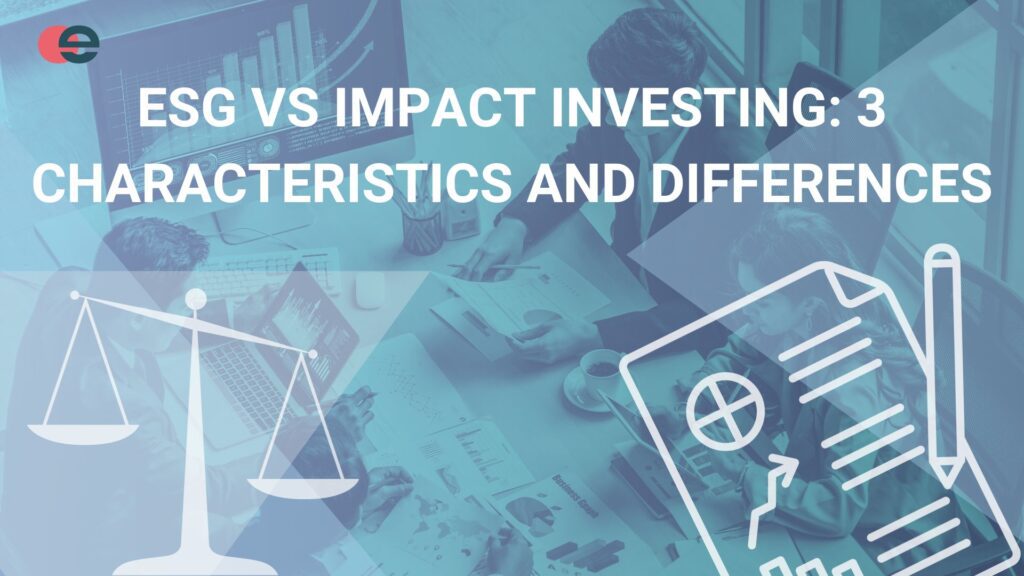In today’s world, Environmental, Social, and Governance (ESG) investors seek avenues that generate financial returns while making a positive impact on society and the environment. This has given rise to impact investing, which aligns financial goals with social and environmental well-being. In this article, we will explore impact investing’s core characteristics — additionality, intentionality, and measurability—and how to distinguish it from ESG investing.
What is Impact Investing?
Impact investing involves investing your money into companies, organizations, and funds with a dual mission: not only to yield a financial return but also to create a tangible and positive influence on the world, whether it’s for social betterment or environmental betterment. Impact Investments share three characteristics:
Additionality
Additionality is a crucial concept in impact investing. It refers to the potential of an investment to generate important sustainability outcomes that would otherwise not have taken place. For instance, an investment made in a sustainable company whose access to financing isn’t a sake is likely to bear lower additionality than an investment made in an early-stage enterprise developing an innovative solution in a nascent market.
Examples of impact investment strategies with strong additionality are:
- Investing in systemic impact by collaborating with civil society
- Public authorities to scale private initiatives that can bring positive benefits,
- Investments in early-stage social businesses or in emerging markets,
- Enterprises developing solutions for vulnerable communities with low purchasing power, etc.
Additionality is a fundamental principle that ensures impact investments make a tangible difference in the world
Intentionality
Intentionality is a key principle in impact investing. It involves investing in enterprises that intentionally pursue social and environmental objectives. Such intention is expressed in the company’s articles of association, its mission statement and in its business strategy. Intention is key for impact investing as it provides the foundation for sound impact management. If impacts are a by-product of a non-sustainable business, the company will have very little incentives to actively measure and optimise its social or environmental performance overtime, making it difficult to comply with the third characteristic.
Measurability
Measurability is essential for impact investing to ensure accountability and transparency. Impact investors seek to quantify and manage the social and environmental impacts of their investment portfolio. This measurement is crucial to ensure that impact capital goes where it can create the most positive change. Besides, impact measurement is also meaningful to evaluate the quality of investor’s contributions to portfolio companies and society, or in other words: their additionality. This is why measurement is relevant for tracking “Portfolio Impact” but also “Investor impact”. Various tools and frameworks, such as the Social Value Principles and SROI, the SDG Impact Standards or BCorp assessments can assist impact investors in measuring, reporting and managing their investments’ outcomes.
3 Differences between ESG and Impact Investing
While both impact investing and ESG pay attention to social and environmental implications, they differ in objectives and approaches. Here are three important differences:
- Impact investing aims to generate measurable, positive social and environmental outcomes alongside financial returns, targeting specific sustainable development goals or societal challenges. There are different shades of impact investing, with more and more investors accepting concessionary financial returns to achieve significant positive impact. ESG investments predominantly focus on achieving risk-adjusted market rate financial returns and considers how ESG factors affect these returns from risks and opportunities perspective. An implication is that ESG investors will tend to support companies that manage negative impacts to reduce exposure to reputational risks.
- The perspective on materiality is different. While impact investors seek to support businesses that actively measure and manage their impact on communities, the environment and external stakeholders, ESG investors typically consider how the external environment affects the financial prospect of a business. This difference can be expressed in terms of “inside-out” vs. “outside-in”, where impact investing adopts an inside-out perspective whilst ESG investors focus on an “outside-in” one.
- Because of the characteristics of impact investing (additionality, intentionality, measurability), impact investments are more frequent within non-listed companies, from small grassroot enterprises to growth companies. ESG investors predominantly focus on financing listed companies that actively manage ESG risks and opportunities.
Conclusion
Impact investing represents a significant shift in finance, emphasising stakeholder materiality alongside financial materiality. It aims to create positive social and environmental change by investing in businesses often overlooked by traditional or even ESG investors. As responsible investing grows, impact investing plays a pivotal role in shaping a more sustainable and inclusive economy.
Frequently Asked Questions
What is ESG?
ESG stands for Environmental, Social, and Governance. It is a framework used to evaluate a company’s sustainability and ethical impact. ESG criteria assess a company’s environmental practices, social responsibility, and governance structure to gauge its ethical and long-term performance.
What is an Impact Investment?
An impact investment is an investment that seeks to generate positive social and environmental outcomes alongside financial returns. It involves investing in businesses, projects, or organisations with the intent of creating significant net positive and measurable impact on people, communities or the planet.
Is ESG Investing the same as Impact Investing?
No, ESG Investing (Environmental, Social, and Governance) and Impact Investing are not the same. ESG focuses on assessing ESG risks and opportunities that are financially material to a company. Impact Investments intentionally seeks to generate positive social and environmental impacts on the world alongside financial returns.
These courses might interest you

Impact Investing Fundamentals

Structuring Hybrid Impact Investments








